Google Pixel 8 Pro release date, price, specs, colors and camera upgrades
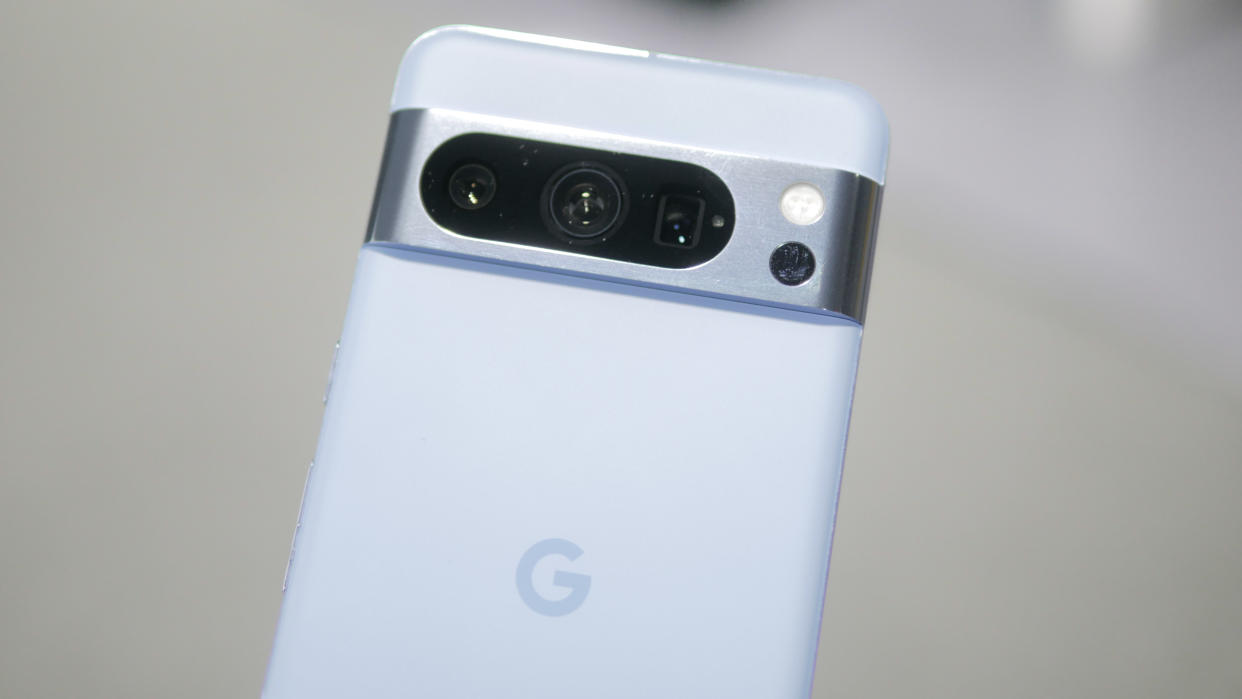
The Google Pixel 8 Pro is finally here, with Google revealing both it and the Google Pixel 8 at the Made by Google event. Given the sheer number of leaks, very little of this is surprising, but it's clear Google has been hard at work upgrading the phone with new hardware and features — to make it the best Pixel yet.
It's also an opportunity for Google to fix some of the problems of the Pixel 7 series. The Pixel 7 Pro was a fantastic phone, but it did suffer from fairly elementary issues that Google shouldn't still be making. The Pixel 8 Pro has the chance to put that right, and reinforce Google as one of the world's top smartphone makers — with performance to rival the iPhone 15 or Samsung Galaxy S23.
Thankfully, on paper, things are looking pretty impressive. Here's everything you need to know about the Google Pixel 8 Pro, including pricing, release date, camera upgrades, colors and more.
Google Pixel 8 Pro: Release date and price

The Google Pixel 8 Pro will be released on October 12 with prices starting at $999. That gets you 128GB of storage, though more spacious options are available if you're willing to pay more. You can pick up a model with 256GB for $1,059, 512GB for $1,119 and 1TB for $1,219. So not quite as competitive as previous Pixel models.
Color options for the Pro model include Obsidian, Porcelain and Bay (blue). Official Pixel 8 Pro cases will also be available from the Google Store, in Obsidian, Porcelain, Bay, Coral and Mint.
Anyone that pre-orders the phone before release day will get a free Pixel Watch 2 thrown in absolutely free.
Google Pixel 8 Pro: Design and Display
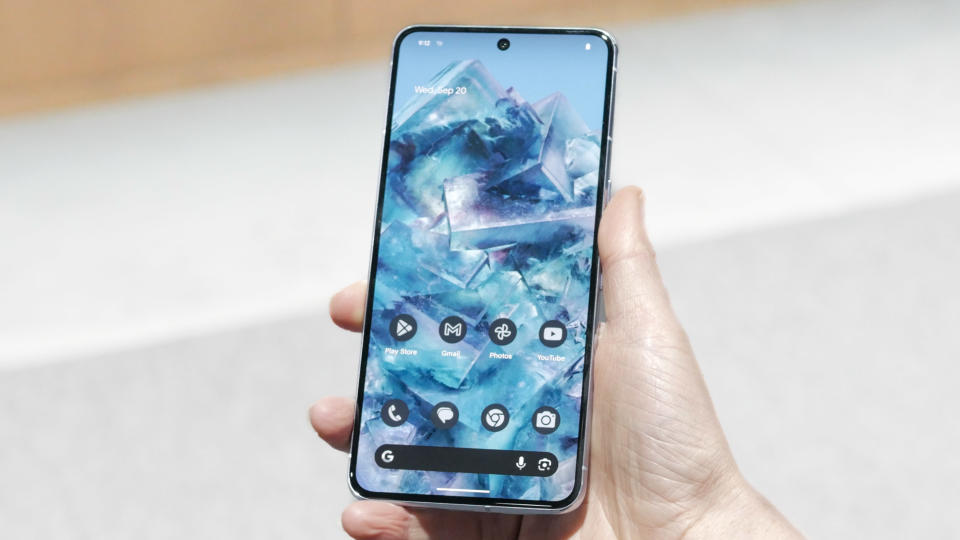
If you're familiar with the look of the Pixel 7 Pro then the Pixel 8 Pro won't look that surprising. It seems Google has found a look that suits its phones and will be sticking with it for at least another year.
That means the Pixel 8 Pro has the same same full-length camera bar and the Pixel 7 Pro, though this time there's a single oval-shaped camera cutout instead of two. The camera flash has been moved up slightly to make room for the temperature sensor beneath it.
The front of the 8 Pro doesn't look all that different either, though Google has added some serious upgrades this time round. This is Google's new "Super Actua" display, a 6.7-inch LTPO OLED display, offering 1244 x 2992 resolution and an adaptive refresh rate of 1-120Hz.
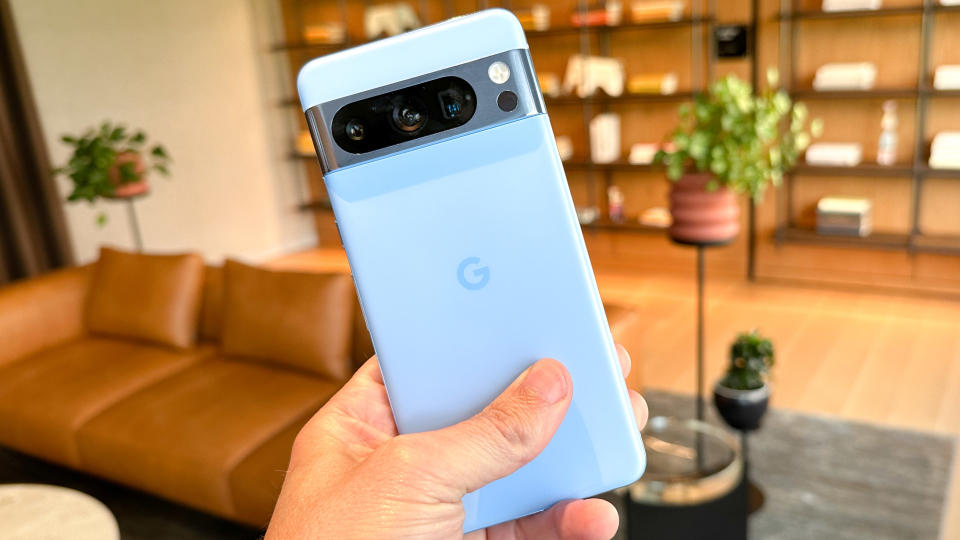
As rumored Google appears to have ditched the curved edge displays of previous Pro Pixels, in favor of a regular flat screen.
The real upgrade here is that the Super Actua display has 1,600 nits of HDR brightness, and a peak brightness of up to 2,400 nits. That makes it one of the brightest phone displays currently available. More so than the iPhone 15 pro Max and the Samsung Galaxy S24 Ultra.
The Pro measure in at 6.4 x 3.0 x 0.3 inches, and weights 7.5 ounces. The frame is made from polished aluminum, with both front and back glass made from Gorilla Glass Victus 2 — the same super-strong display glass as the Samsung Galaxy S23. The back glass also has a matte finish, rather than the glossy polished look of previous phones.
Contrary to rumors, the Pixel 8 Pro isn't going eSIM-only and there is still a standard dual-SIM card slot. Plus, as always, there's an under-display fingerprint sensor and Face Unlock powered by the front camera.
Google Pixel 8 Pro: Colors

The Pixel 8 Pro is available in three different colors, offering the same Porcelain and Obsidian options as the Pixel Fold, while also dropping the Pixel 7 Pro's Hazel option in favor of Bay (a shade of blue).
These colors will also offer a matte glass finish, something we've never seen on a Pixel phone before. That should make it more aesthetically pleasing, while also ensuring a little bit more grip than traditional polished glass has to offer.
As ever Google has its own range of first party cases, with five different color options to choose from. You have the same Obsidian, Porcelain and Bay options as the phone itself, alongside Mint and Coral. Mint is, as the name suggests, a lighter variant of green, while Coral is the same reddish pink color that debuted with the Pixel 7a.
Google Pixel 8 Pro: Cameras
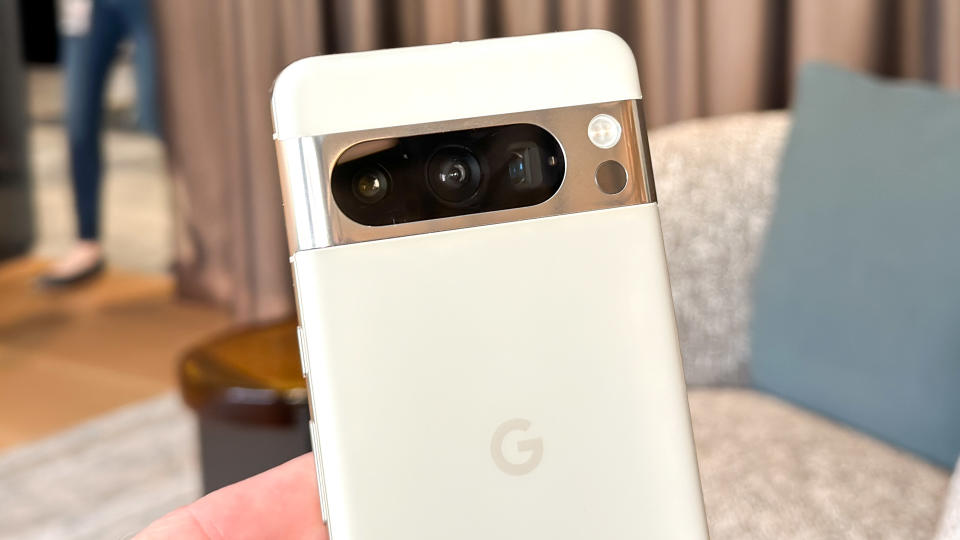
Photography is always one of the Google Pixel's main selling points, and the Pixel 8 Pro looks like it won't be an exception to that trend. It's possible that we have a contender for the best camera phone.
On the rear we have a 50MP main camera lens, offering the same 1.2μm pixel size as the Pixel 7 Pro. The same is true of the 1/1.31-inch sensor, though the aperture has increased to f/1.68. This camera comes with a "2x Optical Quality" which is a fancy way of saying it can digitally mimic 2x zoom magnification similar to an iPhone 15.
The ultrawide camera lens resolution has risen to 48MP this year, along with a 0.8μm pixel width, a f/1.95 aperture and a 125.5 degree field of view. The telephoto lens is also 48MP, with 0.7μm pixel width, f/2.8 aperture and 5x optical zoom. As ever the Pixel 8 Pro has Google's Super Res Zoom technology, which digitally enhances magnification up to 30x.
Over on the front we have as 10.5MP selfie camera with 1.2μm pixel width, f/2.2 aperture and Autofocus —which is new this year.
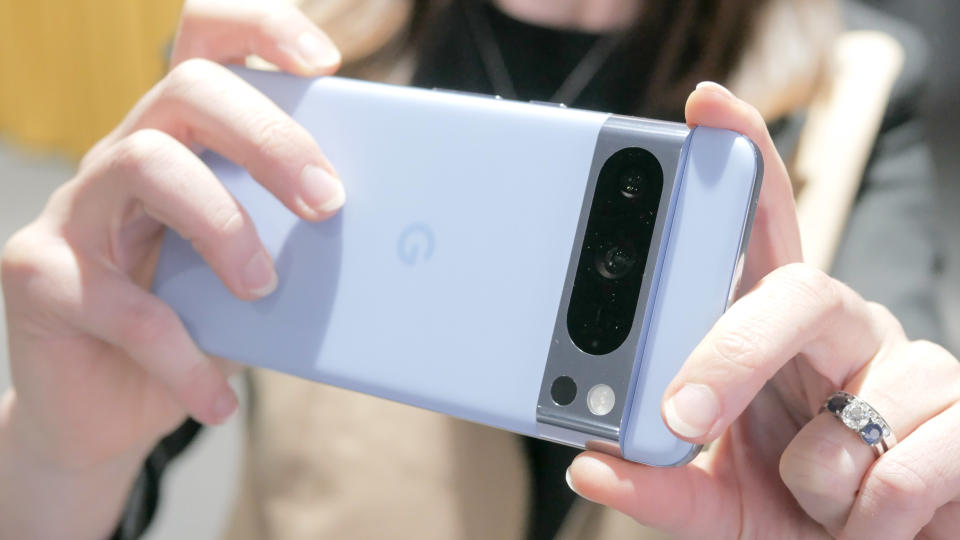
Of course hardware is only ever part of the equation where Google cameras are concerned, and the Pixel 8 Pro does not disappoint. You have many of the same features as the Pixel 7 pro, like Magic Eraser, Photo Unblur, Motion Mode and Astrophotography, but Google has added some other features in as well.
Those features include Ultra HDR, high-resolution images, Magic Editor and new Pro controls — for all the serious photographers that want finer control over their camera's settings.
Once again the front and back cameras are capable of recording 4K and 1080p video in up to 60FPS, as well as 240FPS slo-mo video with 4K and astrophotography timelapse modes.
But there are new features to be enjoyed as well. The long-rumored Video Unblur doesn't seem to have materialized, but we do have Video Boost, Night Sight video, Macro Focus and the Audio Magic Eraser — which can remove or eliminate certain unwanted noise to improve the sound in your videos.
Google Pixel 8 Pro: Performance
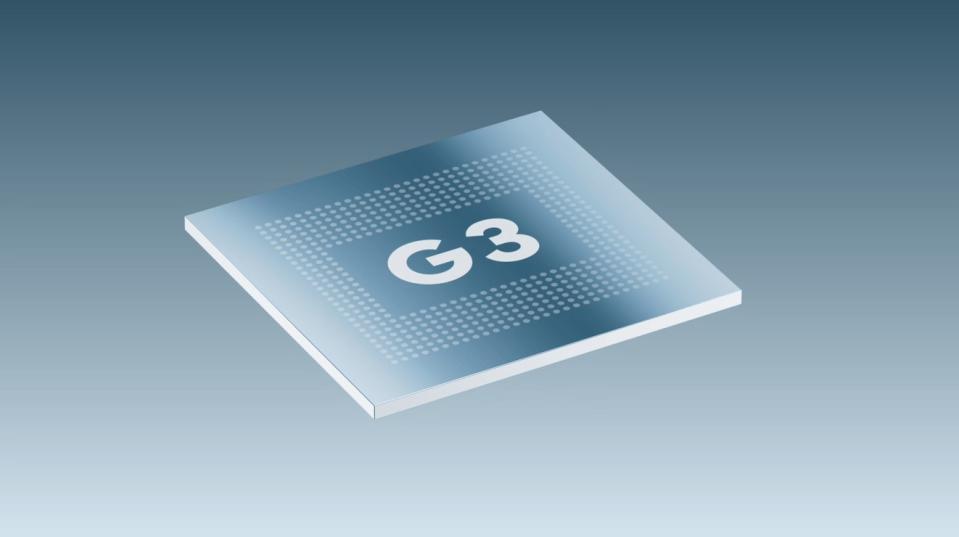
Google's been using its own chips for the past couple of Pixel generations, and the Pixel 8 Pro is no exception. This year the Pixels are running on the Google tensor G3, alongside the Titan M2 security coprocessor. The Pixel 8 Pro also comes with 12GB of RAM
While we haven't had chance to test the Pixel 8 Pro thoroughly, it's unlikely that this chip offers state-of-the-art performance. Not on the same level as an Apple's A17 Pro or the upcoming Snapdragon 8 Gen 3 at any rate. But that's not what the Tensor chipset is for — instead it's built to enhance AI functionality, improve computational photography and offer better security.
Of course we won't be able to see what the phone can handle until we can do some first-hand testing.
Google Pixel 8 Pro: Battery and charging
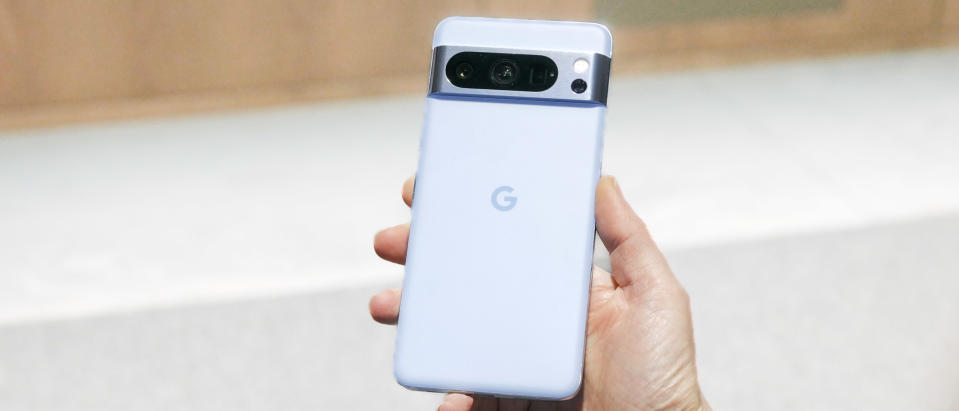
Unfortunately for the Pixel 8 Pro, it is getting a slightly smaller battery than the Pixel 7 Pro — 4,950 mAh vs the 7 Pro's 5,000 mAh. This is not what we want to see from a phone in a family known for weak battery life, but here's hoping that that Google's making the Pixel 8 Pro run more efficiently overall.
We won't know for sure how well the Pixel 8 pro's battery performs until we do some battery testing, though Google claims that the phone offers a "Beyond 24-hour battery life" which can be extended to 72 hours with Extreme Battery Saver. Though this is also what Google said last year, and the Pixel 7 Pro's actual battery life turned out to be very disappointing.
Charging has had a minor boost this year, though, with the Pixel 8 Pro now supporting 30W recharging speeds. According to Google this adds up to a 50% recharge in 30 minutes — provided you have at least a 30W charger with USB-PD 3.0 support.
Wireless charging is still stuck at 23W if you have a Pixel Stand 2, or 12W with any other Qi wireless charger. Sadly since the Qi2 specification isn't finalized yet, the Pixel 8 Pro only supports the original Qi standard.
Google Pixel 8 Pro: Software

The Pixel 8 Pro will run Android 14, Google's latest version of Android. The newest flagship Pixels are always the first phones to get the next big Android update, and we don't expect that to change this year.
What is changing, however is Google's support window. Last year Google upped its software support to offer three years of full Android updates and five years of security updates. This year that's being more than doubled, with Google promising that Pixel 7 and Pixel 7 Pro phones will get 7 years of full software support. That includes everything, Android, Pixel feature drops and security updates.
That blows away just about everyone, and the only phone maker we know of that has promised to do better is Fairphone — who have promised 8 years of full updates for Fairphone 5 but are aiming to hit the 10 year mark.
Google has also confirmed that it will be activating lossless USB audio in the Pixel 8 Pro as part of a future software update. Thanks to the feature being part of the Android 14 OS, it means Google phones will hopefully be one of many Android devices to offer support for clear, crisp audio.
Google Pixel 8 Pro: Outlook

The upgrades that have come to the Pixel 8 Pro are pretty substantial, and it seems that the phone will continue to do everything the Pixel series does best. We know exactly how much has changed until we get some serious time with the phone, but based on what we've heard things are looking good.
Of course there are plenty of things the Pixel series has struggled to do well in the past — like the infamously weak battery life. Google has proven it can improve these issues with recent releases, like the Pixel Fold and Pixel 7a, but we're going to have to wait and see how the Pixel 8 Pro actually performs.
Whatever happens, it's clear that the Pixel 8 Pro is still one of the most important phone launches of 2023. So let's just hope Google hasn't fudged any key features this year.
